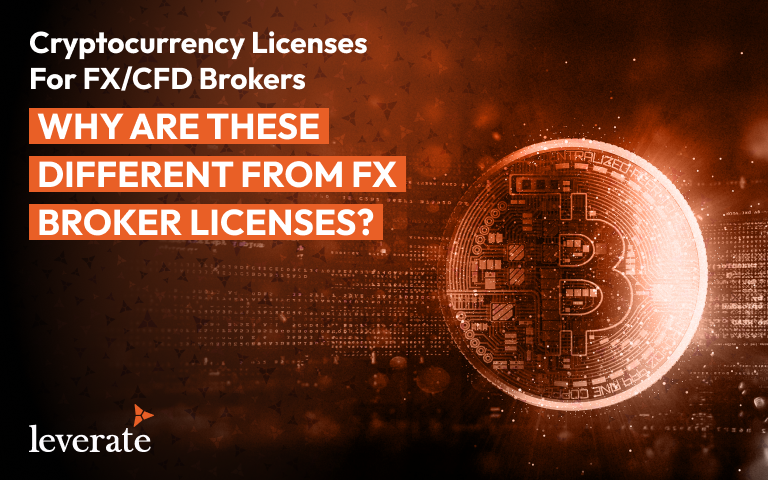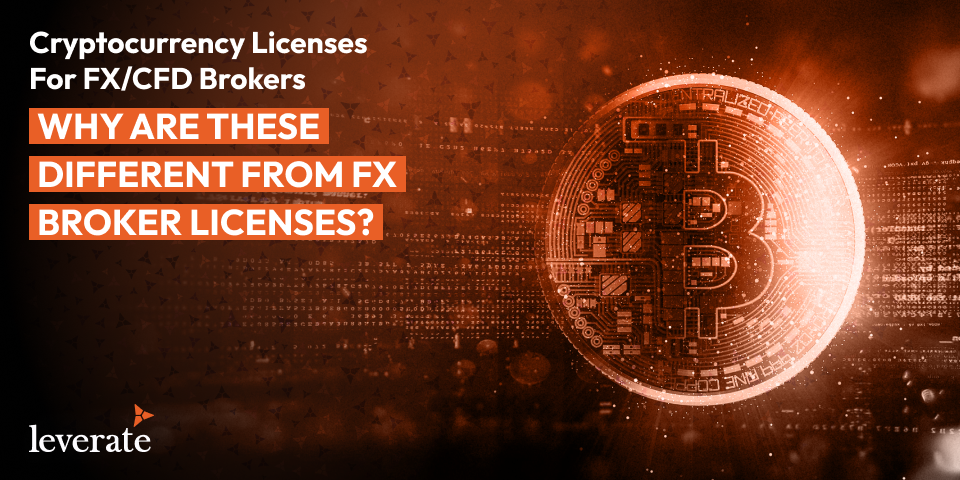Cryptocurrency Licenses for FX/CFD Brokers: Why are these Different from FX Broker Licenses?
Essentially, there is a huge difference between a traditional FX Broker license, issued by a regulatory agency such as the FCA, CySEC, ASIC, etc., and a license to offer cryptocurrencies. The traditional FX licenses, as we all know, allow an FX Broker to offer many instruments to its clients and allow them to trade forex pairs, metals, crude oil, equities, indices, etc. The post Cryptocurrency Licenses for FX/CFD Brokers: Why are these Different from FX Broker Licenses? appeared first on Leverate.


Essentially, there is a huge difference between a traditional FX Broker license, issued by a regulatory agency such as the FCA, CySEC, ASIC, etc., and a license to offer cryptocurrencies. The traditional FX licenses, as we all know, allow an FX Broker to offer many instruments to its clients and allow them to trade forex pairs, metals, crude oil, equities, indices, etc.
Depending on the jurisdiction, the FX Broker may also offer any number of cryptocurrency pairs, but only as Contracts for Difference (CFDs), often paired with USD or other cryptocurrencies. In the traditional business models, the broker makes its profit on the spreads, commissions, and swaps, or acts as a market maker.
However, some jurisdictions will not allow the trading of cryptocurrency CFDs. The FCA of the UK issued an edict in October of 2020 stating:
The FCA considers these products to be ill-suited for retail consumers due to the harm they pose. These products cannot be reliably valued by retail consumers because of the:
- inherent nature of the underlying assets, which means they have no reliable basis for valuation
- prevalence of market abuse and financial crime in the secondary market (eg cyber theft)
- extreme volatility in crypto asset price movements
- inadequate understanding of crypto assets by retail consumers
- lack of legitimate investment need for retail consumers to invest in these products.
These features mean retail consumers might suffer harm from sudden and unexpected losses if they invest in these products.
This forced UK-based, FCA-regulated brokers to suspend the offering of crypto CFDs while most other jurisdictions still allow them. However, most other jurisdictions have put tight restrictions on the margin requirements for crypto CFDs in an effort to protect retail traders. To alleviate such issues, many brokers have set up shop in multiple jurisdictions in an effort to offer as many instruments as possible, including crypto CFDs, to their customers.
So? Then what exactly is a Cryptocurrency (often referred to as Digital Asset) license? This license, offered by more and more jurisdictions, is a license to create an exchange, offer investment opportunities to retail and professional investors, and allow said investors to hold digital assets in encrypted wallets. Also, under certain conditions, the exchange may offer interest on account balances in the form of staking.
The big difference, in the eyes of the regulators who are trying to protect retail investors, is the margin requirement. An exchange holds a digital asset in the name of the investor, at face value. Of course, the value of that investment will fluctuate as all cryptocurrencies will do but there is no danger of a retail investor “blowing up” their account because they placed a trade with the wrong position size by misunderstanding the margin requirement.
The other big difference for most regulators is that there may be no compensation scheme for investors in assets under these crypto exchanges. The FCA has gone out of its way to make this clear to retail investors, even though some of the world’s largest and most well-known exchanges are FCA-regulated.
Just as we find with FX/CFD Broker licensing, every jurisdiction has a slightly different take on the issuing of Digital Asset licenses. In the United States, for example, an aspiring exchange must apply as a Money Service Business and a Money Transmitter in each state where it wants to operate. In Canada, there is an overall regulation for the country but a digital asset dealer must be registered in every province in which it finds its customers. In both cases, in the US and Canada, the regulator has no compensation scheme or insurance to protect investors, as they would normally do with fiat assets.
Many of the offshore jurisdictions, very familiar to the FX Broker, have started offering Digital Asset Licenses but a prospective exchange operator needs to do their homework. For example, in Vanuatu, one must hold an existing license for FX deliverables, equity/commodity trading, or derivative broker before applying for the Digital Asset License. To make matters more complicated, the fees are roughly 4 times that of the original license along with a huge “minimum capital issued” requirement.
Mauritius, as a favored destination for many FX brokers, allows an entity to apply for its VAITOS (Virtual Asset and Initial Token Offering Services) without holding an existing broker license. And, completely contrary to other regulators, Labuan, a financially independent jurisdiction within Malaysia, offers a Digital Wrapper which is included as an extension to a standard money broker license required by FX brokers. This type of structure can be favorable in terms of initial and ongoing costs for the aspiring FX Broker and Crypto Exchange Operator.
We have also noticed that many traditional jurisdictions for the gaming industry are branching out and offering licensing to FX Brokers and Crypto Exchanges. Also, areas like Saint Lucia, which traditionally only offered company incorporations with a “legal opinion” to operate financial businesses, are rumored to be preparing for a proper Digital Asset licensing scheme, but no one seems to know when. Watch this space!
The post Cryptocurrency Licenses for FX/CFD Brokers: Why are these Different from FX Broker Licenses? appeared first on Leverate.







